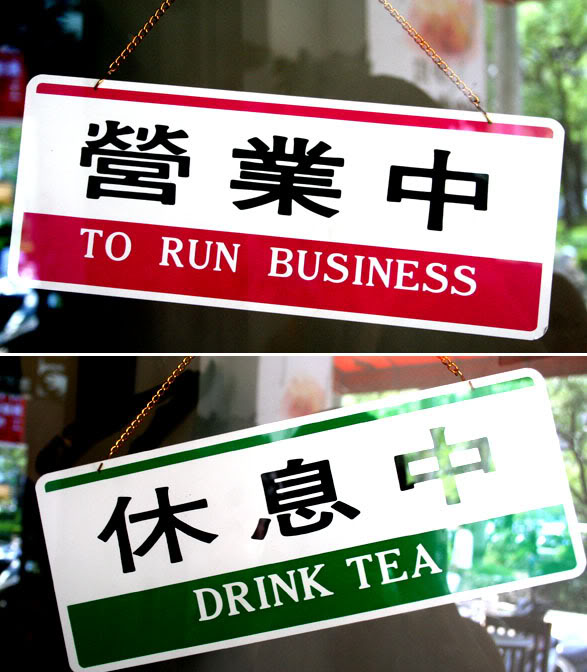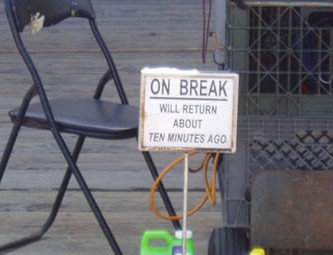In the middle of
« previous post | next post »
In "Beginning of the Semester Blues," I surmised that Chinese translators and translation software seemed unable to handle the construction "XX zhōng" "XX 中" ("in the process / midst of XX"). Two more examples sent in by Dan Bloom would seem to confirm that surmise.

The first sign, the one in red, reads:
Yíngyè zhōng 營業中 TO RUN BUSINESS
Idiomatically rendered, that should be "Open for Business" or just "Open."
The second sign, the one in green, reads:
Xiūxí zhōng 休息中 DRINK TEA
Xiūxí literally means "rest," and has nothing to do with drinking tea, unless one habitually drinks tea when one takes a rest (which is what many, but not all, Chinese workers do). A more idiomatic rendering into English would be "On Break," as in the following sign (never mind the second part):

What this tells us about the perils of translation, I believe, is that, if sorting out the meanings of words in a text to be translated is difficult, making sense of grammar and syntax is even more subtle and challenging.
[By the way, Google Translate renders "營業中" as "Business in", and "休息中" as "Rest of". In context, it may be possible to figure out what these translations probably mean (though the same could be said about "To Run Business" and "Drink Tea"). But it's interesting to speculate about how many common idioms there are of the form __中, and what sort of process applied to what sort of training material would allow a statistical MT system to learn them and to apply them correctly.]
Mr Fnortner said,
September 10, 2010 @ 7:15 am
"Drink Tea" is not much different from "Coffee Break", which is an idiom for a few minutes from one's duties for a bit of refreshment, but I can see how "On Break" makes a better sign. I love the wording of the example sign, BTW.
Jonathan said,
September 10, 2010 @ 8:12 am
"Tea break" surely? The BAILII database at http://www.bailii.org/form/search_cases.html has 60 entries for the phrase "tea break" but only 16 for the phrase "coffee break".
David said,
September 10, 2010 @ 8:22 am
It's worth noting that 休息中 is also used for 'closed' (the opposite of 营业中). Many shops display such a sign overnight.
Ellen K said,
September 10, 2010 @ 9:54 am
@Mr Fortner: Surely the difference between saying what one is doing (coffee break), versus telling the reader what to do (drink tea) is pretty large.
Robert Sharp said,
September 10, 2010 @ 10:21 am
I have to say, due to the English translations and colors of these signs, I took them to mean the opposite of what they were intended to mean.
I saw a red sign saying "To run business" which to me said "We are temporarily closed; we're running an errand" and a green sign "Drink tea" that said "Come on in and have some tea; we're open".
Terry Collmann said,
September 10, 2010 @ 11:02 am
The little translation widget on my Mac, powered by Systran, translates 營業中 as "in business" and 休息中 as "in rest", which are reasonably understandable in context, if not idiomatic …
KWillets said,
September 10, 2010 @ 2:55 pm
That's a common Korean idiom as well (–는 중 (中), –nun joong ), but it has a particle so it seems to work in MT:
쉬는 중 = During recess (Google translate, verb is "to rest")
Patterns like this are really just the tip of the iceberg for MT's and Korean.
Victor Mair said,
September 10, 2010 @ 7:23 pm
On February 06, 2006, Benjamin Zimmer wrote a post on Language Log that was entitled "986,120 words for snow job."
http://itre.cis.upenn.edu/~myl/languagelog/archives/002809.html
In this post, Ben refers to both of the notices on the green and red signs discussed above. What is curious, though, is that they are spelled without spaces as "torunbusiness" and "drinktea," not as we see them in the photographs above, "TO RUN BUSINESS" and "DRINK TEA." The would-be word maven, J J Payack (president of Global Language Monitor <<http://www.languagemonitor.com/>>), is apparently responsible for this conflation. In any event, Mr. Payack cites "torunbusiness" and "drinktea" as two of the 20,000 new words that had supposedly entered the English language the previous year. Of these, 20% were said to be Chinglish words like "torunbusiness" and "drinktea."
Despite the fact that I keep a close watch out for Chinglish usage, I have not noticed that "TO RUN BUSINESS" and "DRINK TEA," much less "torunbusiness" and "drinktea," have emerged as fixed, recurring terms, so I don't think that they can be considered part of some imagined Chinglish vocabulary. All the more, they cannot be counted as part of the English lexicon.
Dan Bloom said,
September 12, 2010 @ 1:34 am
Thank you, Dr Mair, for these explanations. It's amazing, but all this time in Taiwan, seeing these signs every day, I never knew all this. From the red sign, it was easy to infer it means OPEN TO RUN OUR BUSINESS, to run the story, so I figured it meant OPEN FOR BUINESS. I am still trying to contact the firm that makes the signs to ask them to print a better English phrase next time they make a new batch for sale.
As for the DRINK TEA sign, wow, i really thought that meant PLEASE COME IN AND DRINK TEA WITH US, i had no idea it meant break time. Wow, that really floors me! Thanks for the heads up. that sign really needs to be changed. i am on the case now. if i ever locate the firm that makes then, i will report back to you. give me 25 years…..
smile
bryan said,
September 12, 2010 @ 4:00 pm
營業中 = "[In the midst of] doing business" / "Open for business", which shouldn't be translated as "To run business" or "Run for Business"
經營 = To run, as in "To run a business", shouldn't be abbreviated or shortened in Chinese to ensure there's no confusion. When doing business, you don't want to confuse your business partners nor do you want to confuse your clients / customers either.
休息中 is used literally, while "Drink tea" is used figuratively.
休息中 = resting, but here it's used to mean "Time off"; "On break", etc…
"Drink Tea" – This person has to be a Cantonese speaker. It is from 飲茶. In Cantonese, this phrase = literally, to drink tea, if offering tea for someone to drink. But if that's not the case, then it's the other case: Someone's out to Chinatown or some Chinese neighborhood's restaurant to have "dim sum" where tea would be served. In other words, this can be properly used to say "Lunch break / Out to Lunch / On Break / Will be back soon". I found Google Translator's translations to be horribly out of touch.
It's worth noting that 休息中 is also used for 'closed' (the opposite of 营业中). Many shops display such a sign overnight.
That's only because: There's no such sign as 打烊 [Closed for business]
That's a common Korean idiom as well (–는 중 (中), –nun joong ), but it has a particle so it seems to work in MT:
쉬는 중 = During recess (Google translate, verb is "to rest")
Hello? Korean Hanja = Chinese characters. Koreans used the same characters as the Chinese, where most of them didn't change, EXCEPT for some Korean-made characters, which most Korean language learners will not know about unless it's on technical vocabulary.
In both signs, 中 = during; in the meantime, etc… Doesn't mean "in", unless it's a reference to "in the midst of something; during something", etc…
ON BREAK | Will be back ten minutes ago.
No comment. Just kidding.
This shows that people don't care about the consumers/clients/customers but just about about the money. If they did care, then they would know that "Will" is used telling about some future event. But putting "ten minutes ago" really makes you laugh… If you were back ten minutes ago, why is there still a need for the sign at all?
Dregs said,
September 13, 2010 @ 3:15 am
Of course, sometimes the signs get the "in progress" part correct but muddle up the action….
http://www.chineseenglish.com/tag/execution-in-progress/
Dan Bloom said,
September 13, 2010 @ 3:26 am
I found the sign company, Salmon International Co. Ltd, in Kaohsiung that makes those signs and plan to visit the office soon. My plan is to ask the boss to change the trnaslations for the better when and if he makes a new batch in 2011 or 2012…..Never too late to try.
Address and link is
http://www.salmon-co.com.tw
Dan Bloom said,
September 13, 2010 @ 8:38 am
The Apple Daily newspaper in Taiwan plans to look into these mistranslations now, after reading Dr Mair's blogpost above. At the Kaohsiung firm that makes these signs, a few more good ones:
http://www.salmon-co.com.tw/RA.htm
For example: see link above
Please infuse after throw up
Don't entrance without invited
Thank for your visit
No Visiton (picture of woman? WTF?)
Today is OFF.
Coming without food.
THING is, these would all be so easy to correct, if they had a native
English speaker on staff, or if they asked a local college in their area to help them as surely there are expat professors and students there. But. No.
Sili said,
September 13, 2010 @ 1:30 pm
As Robert Sharpe says I find the choice of colours confusing. Is this standard in China and am I just too mired in my own culture?
groki said,
September 13, 2010 @ 1:38 pm
@Dan Bloom: true, most of those are awkward. but plenty of times I could definitely use a sign saying "Today is OFF."
Will said,
September 13, 2010 @ 6:26 pm
I saw a sign like this in Taipei — have to see if I have pictures, because I think the one I saw *did* say "Drink tea" in Chinese too. As an avid tea drinker, I briefly tried to find one for myself, but didn't have any luck. Either way, I think the meaning is clear.